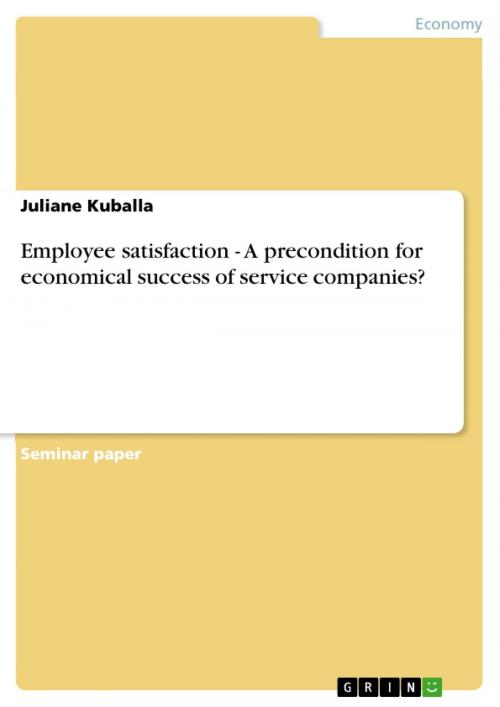Employee satisfaction - A precondition for economical success of service companies?
A precondition for economical success of service companies?
Business & Finance, Human Resources & Personnel Management| Author: | Juliane Kuballa | ISBN: | 9783638593052 |
| Publisher: | GRIN Publishing | Publication: | January 16, 2007 |
| Imprint: | GRIN Publishing | Language: | English |
| Author: | Juliane Kuballa |
| ISBN: | 9783638593052 |
| Publisher: | GRIN Publishing |
| Publication: | January 16, 2007 |
| Imprint: | GRIN Publishing |
| Language: | English |
Seminar paper from the year 2006 in the subject Business economics - Personnel and Organisation, grade: 74%, Northumbria University, 27 entries in the bibliography, language: English, abstract: Today increased globalisation and declined market conditions like decreasing brand loyalty, high levels of information transparency and fast shifting technological developments complicate the road to success for many companies. Particularly for service organisations, and the sales departments of manufacturing companies, front-line employees play a key role in securing and boosting profits under difficult market conditions as they directly interact with customers. The interaction between employees and customers is very critical as employees are mainly responsible for creating an excellent public image of the company. For that reason new management practices were developed in order to enhance customer focus as well as employee satisfaction. Many scholars argue that what happens to employees inside a company considerably affects what happens to customers outside the company. They establish a direct context between employee satisfaction, customer satisfaction and - as a pre-eminent consequence - the company's performance. This academic assignment demonstrates the impact of employee satisfaction on organisational performance and profitability especially in regard to companies in the service sector. The service profit chain of Hesskett et al. (1994) suggests that employee satisfaction and loyalty are the key drivers of service value, customer satisfaction, customer loyalty and profitability. Based on this model the general linkages are critically analysed in order to prove whether a positive relationship does really exist. In this context the intent is not to provide an analysis of the factors that cause employee satisfaction but the resulting effects that can be realized regarding the following components of the chain.
Seminar paper from the year 2006 in the subject Business economics - Personnel and Organisation, grade: 74%, Northumbria University, 27 entries in the bibliography, language: English, abstract: Today increased globalisation and declined market conditions like decreasing brand loyalty, high levels of information transparency and fast shifting technological developments complicate the road to success for many companies. Particularly for service organisations, and the sales departments of manufacturing companies, front-line employees play a key role in securing and boosting profits under difficult market conditions as they directly interact with customers. The interaction between employees and customers is very critical as employees are mainly responsible for creating an excellent public image of the company. For that reason new management practices were developed in order to enhance customer focus as well as employee satisfaction. Many scholars argue that what happens to employees inside a company considerably affects what happens to customers outside the company. They establish a direct context between employee satisfaction, customer satisfaction and - as a pre-eminent consequence - the company's performance. This academic assignment demonstrates the impact of employee satisfaction on organisational performance and profitability especially in regard to companies in the service sector. The service profit chain of Hesskett et al. (1994) suggests that employee satisfaction and loyalty are the key drivers of service value, customer satisfaction, customer loyalty and profitability. Based on this model the general linkages are critically analysed in order to prove whether a positive relationship does really exist. In this context the intent is not to provide an analysis of the factors that cause employee satisfaction but the resulting effects that can be realized regarding the following components of the chain.















